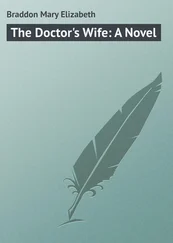Mary Braddon - The Infidel - A Story of the Great Revival
Здесь есть возможность читать онлайн «Mary Braddon - The Infidel - A Story of the Great Revival» — ознакомительный отрывок электронной книги совершенно бесплатно, а после прочтения отрывка купить полную версию. В некоторых случаях можно слушать аудио, скачать через торрент в формате fb2 и присутствует краткое содержание. Жанр: foreign_prose, на английском языке. Описание произведения, (предисловие) а так же отзывы посетителей доступны на портале библиотеки ЛибКат.
- Название:The Infidel: A Story of the Great Revival
- Автор:
- Жанр:
- Год:неизвестен
- ISBN:нет данных
- Рейтинг книги:5 / 5. Голосов: 1
-
Избранное:Добавить в избранное
- Отзывы:
-
Ваша оценка:
- 100
- 1
- 2
- 3
- 4
- 5
The Infidel: A Story of the Great Revival: краткое содержание, описание и аннотация
Предлагаем к чтению аннотацию, описание, краткое содержание или предисловие (зависит от того, что написал сам автор книги «The Infidel: A Story of the Great Revival»). Если вы не нашли необходимую информацию о книге — напишите в комментариях, мы постараемся отыскать её.
The Infidel: A Story of the Great Revival — читать онлайн ознакомительный отрывок
Ниже представлен текст книги, разбитый по страницам. Система сохранения места последней прочитанной страницы, позволяет с удобством читать онлайн бесплатно книгу «The Infidel: A Story of the Great Revival», без необходимости каждый раз заново искать на чём Вы остановились. Поставьте закладку, и сможете в любой момент перейти на страницу, на которой закончили чтение.
Интервал:
Закладка:
"Oh, he has helped – he has helped me, when our means ran low – as any rich friend would help a poor one. There is nothing strange in that, child," her father explained, with a deprecating air.
"Kilrush!" she repeated, deeply wounded. "It was his kindness changed our lives! I thought we were earning all our comforts – you and I. Why are you taking me to him, sir? I don't understand."
"I am taking you to his death-bed, Tonia. His doctors give him only a few hours of life, and he wants to see you before he dies, to bid you farewell."
The tears were rolling down Thornton's cheeks, but Antonia's eyes were tearless. She sat with her face turned to the village street, staring at the little rustic shops, the quaint gables and projecting beams, the dormer casements gilded by the sunset, Fairfax House, with its stout red walls, and massive stone mullions, and a garden full of roses and pinks, that perfumed the warm air as they drove by. She looked at all those familiar things in a stupor of wonder and regret.
"You often talk wildly," she said presently, in a toneless voice. "Is he really so ill? Is there no hope?"
The horses had swung round a corner, and they were driving by a lane that led to Wandsworth, where it joined the London road. At the rate at which they were going they would be at Westminster Bridge in less than half an hour.
"Alas, child, I have it from his doctor. 'Tis a hopeless case – has been hopeless for the last six months. He has been in a consumption since the beginning of the winter, has been sent from place to place, fighting with his malady. He came to London two days ago, from Geneva, as fast as he could travel – a journey that has hastened his end, the physician told me. Came to put his affairs in order, and to see you," Thornton concluded, after a pause.
"To see me! Ah, what am I that he should care?" cried Tonia.
To know that he was dying was to know that she had never ceased to love him. But she did not analyze her feelings. All that she knew of herself was a dull despair – the sense of a loss that engulfed everything she had ever valued in this world.
"What am I that he should care?" she repeated forlornly.
"You are all in all to him. He implored me to bring you – with tears, Antonia – he, my benefactor, the one friend who never turned a deaf ear to my necessities," said Thornton, too unhappy to control his speech.
"Shall we be there soon?" Tonia asked by-and-by, in a voice broken by sobs.
"In a quarter of an hour at the latest. God grant it may not be too late."
No other word was spoken till the coach stopped at the solemn old doorway in St. James's Square, a door through which Mrs. Arabella Churchill had passed in her day of pride, when the house was hers, and that handsome young soldier, her brother Jack, was a frequent visitor there.
Night had not fallen yet, and there were lingering splashes of red sunset upon the westward-facing windows of the Square; but on this side all was shadow, and the feeble oil-lamps made dots of yellow light on the cold greyness, and enhanced the melancholy of a summer twilight.
The door was opened as Thornton and Antonia alighted. Her father led her past the hall porter, across the spacious marble-paved vestibule that looked like a vault in the dimness of a solitary lamp which a footman was lighting as they entered. Huge imperials, portmanteaux and packing-cases filled one side of the hall; the bulk of his lordship's personal luggage, which no one had found time to carry upstairs, and the cases containing the pictures, porcelain, curios, which he had collected in his wanderings from city to city, and in which his interest had ceased so soon as the thing was bought. He had come home too ill for any one to give heed to these treasures. There would be time to unpack them after the funeral – that inevitable ceremony which the household had begun to discuss already. Would the dying man desire to be laid with his ancestors in the family vault under Limerick Cathedral, within sound of the Shannon?
Antonia followed her father up the dusky staircase, their footfall noiseless on the soft depth of an Indian carpet, followed him into a dark little ante-room, where two men in sombre attire sat at a table talking together by the light of two wax candles in tall Corinthian candlesticks. One of these was his lordship's family lawyer, the other his apothecary.
"Are we too late?" asked Thornton, breathlessly, with rapid glances from the attorney to the doctor – glances which included a folded paper lying on the table beside a silver standish.
"No, no; his lordship may last out the night," answered the doctor. "Pray be seated, madam. If my patient is asleep, we will wait his awakening. He does not sleep long. If he is awake you shall see him. He desired that you should be taken to him without delay."
He opened the door of the inner room almost noiselessly and looked in. A voice asked, "Is she here?"
It was the voice Tonia knew of old, but weaker. Her heart beat passionately. She did not wait for the doctor, but brushed past him on the threshold, and was scarce conscious of crossing the width of a larger room than she had ever seen. She had no eyes for the gloomy magnificence of the room, the high windows draped with dark red velvet, the panelled walls, the lofty bed, with its carved columns and ostrich plumes; she knew nothing, saw nothing, till she was on her knees by the bed, and the dying man was holding her hands in his.
"Go into the next room, both of you," he said, whereupon his valet and an elderly woman in a linen gown and apron, a piece of respectable incompetence, the best sick-nurse that his wealth and station could command, silently retired.
"Will you stop with me to the end, Tonia?"
"Yes, yes! But you are not going to die. I will not believe them. You must not die!"
"Would you be sorry? Would it make any difference?"
"It would break my heart. I did not know that I loved you till you had gone away. I did not know how dearly till to-night."
"And if I was to mend and be my own man again, and was to ask you the same question again, would you give me the same answer?"
"Yes," she answered slowly; "but you would not be so cruel."
"No, Tonia, no, I am wiser now; for I have come to understand that there is one woman in the world who would not forfeit her honour for love or happiness. Ah, my dearest, here, here, on the brink of death, I know there is nothing on this earth that a man should set above the woman he loves – no paltry thought of rank or station, no cowardly dread that she may prove unfaithful, no fear of the world's derision. If I could have my life again I should know how to use it. But 'tis past, and the only love I can ask for now is the love that follows the dead."
He paused, exhausted by the effort of speech. He spoke very slowly, and his voice was low and hoarse, but she could hear every word. She had risen from her knees, to be nearer him, and was sitting on the side of the bed, holding him in her arms. In her heart of hearts she had realized that death was near, though her soul rebelled against the inevitable. She was conscious of the coming darkness, conscious that she was holding him on the edge of an open grave.
"Do not talk so much, you are tiring yourself," she said gently, wiping his forehead with a cambric handkerchief that had lain among the heaped-up pillows. The odour of orange flower that it exhaled was in her mind years afterwards, associated with that bed of death.
He lay resting, with his eyelids half closed, his head leaning against her shoulder, her arm supporting him.
"I never thought to taste such ineffable bliss," he murmured. "You have made death euthanasia."
He lapsed into a half-sleeping state, which lasted for some minutes, while she sat as still as marble. Then he opened his eyes suddenly, and looked at her in an agitated way.
Читать дальшеИнтервал:
Закладка:
Похожие книги на «The Infidel: A Story of the Great Revival»
Представляем Вашему вниманию похожие книги на «The Infidel: A Story of the Great Revival» списком для выбора. Мы отобрали схожую по названию и смыслу литературу в надежде предоставить читателям больше вариантов отыскать новые, интересные, ещё непрочитанные произведения.
Обсуждение, отзывы о книге «The Infidel: A Story of the Great Revival» и просто собственные мнения читателей. Оставьте ваши комментарии, напишите, что Вы думаете о произведении, его смысле или главных героях. Укажите что конкретно понравилось, а что нет, и почему Вы так считаете.












